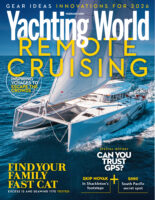Argentina’s Lucas Calabrese has won the 2001 Optimist Worlds, held in the altogether too placid waters off Quingdao, China
Argentina’s Lucas Calabrese is the best Optimist sailor in the world. After a top ten finish in 1999, a silver medal in 2000, Calabrese came to Quingdao with every reason to expect success. The team racing title, also won by Calabrese and his Argentinian colleagues, concluded a very successful regatta for the South Americans.
Criticism of the regatta and its conclusion have marred the end of the 2001 Worlds, with some teams claiming a world class event simply could not be held in the conditions that prevailed. It is equally valid to say that Calabrese could have won by a significantly greater margin has his boathandling skills been tested across a range of conditions.
The choice of Quingdao was a bold and forward-looking one on the part of IODA but the conditions just aren’t up to world class sailing standards. The final race was cancelled due to lack of breeze and the penultimate race suffered from a 78 percent DNF count.
It is, however, a matter for some concern that the 2008 Olympics will be held in Quingdao. If there was discontent at the Optimist Worlds, what sort of reaction might there be after the Olympics if certain countries fail to live up to their billing?
Judging by results here, we can expect a strong Asian challenge in 2008 as their sailors tend to fair very well in light airs. This fact is not related to size or weight as there was no significant difference between oriental and occidental physiques. Rather it reflects the high investment that has been made in Asian sailing for the last decade. Lee Lai Shan’s gold for Hong Kong in the Mistral class at the 1996 Olympics was the first major indicator of progress.
Robert Wilkes, IODA class secretary, explains the different approach to coaching in Asia: “For much of the year south Asia does not have a lot of wind and their coaches are accustomed to sending their sailors out where a northern coach might shrug and hold a theory lesson. With reduced airfares in recent years and the availability of totally one-design hulls to charter, the Japanese and Singaporeans in particular travel widely in search of experience. And their coaches, local except for Singapore, are always eager to learn.
“Perhaps we should not be so surprised: the evidence has been there for a couple of years. In 1999 we had for the first time an Asian sailor in the top ten and whenever winds have been light at other regattas Asians have been in the top places. Earlier this year in Dubai Singapore beat Italy in a special team-racing event at the IODA Asians.”
Regarding the 2008 Olympics, Wilkes was optimistic as ever that the Oppy Roll of Honour will pick up a few more names but not hopeful for good conditions: “Some of the sailors at this year’s Optimist Worlds will be there, just as Ben Ainslie progressed from our 1989 Worlds to an Olympic medal seven years later.
“The venue will not be changed and in summer there is not a lot of wind anywhere in China. The IODA team, which includes two of the five Olympic Race-Officers, have identified areas of the city coastline with a little more wind, but not much.”
British sailors, better known for their performance in heavier airs, found the conditions very difficult in such a competitive fleet of 208. Luke Patience was the top Brit in 55th ahead of Thomas Mallandine, 84th, Josh Metcalfe, 110th, David Evans, 117th and Tom Smedley, 139th.



